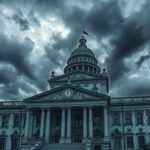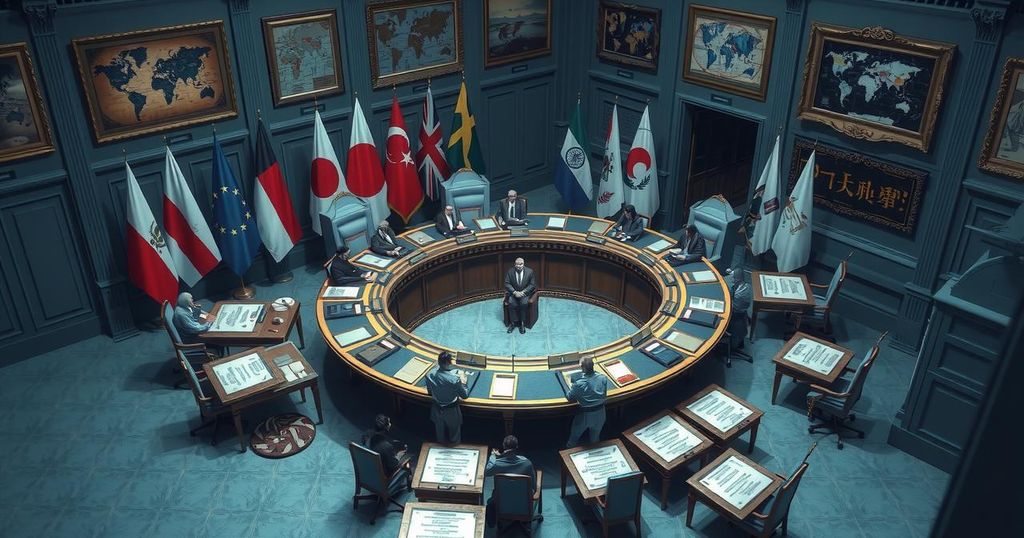Politics
ASIA, BOASBERG, CIRCUIT COURT, DONALD TRUMP, DREW ENSIGN, EL SALVADOR, FEDERAL DISTRICT COURT, JUDICIAL SYSTEM, JUDICIARY, JUSTICE DEPARTMENT, LAW, NORTH AMERICA, PHILIPPINES, SUPREME COURT DECISION, SUPREME COURT RULING, TEXAS, TREN DE ARA, TRUMP, U. S, U. S. COURT OF APPEALS FOR THE DISTRICT OF COLUMBIA CIRCUIT, UNITED STATES, WASHINGTON
Clara Montgomery
Trump Administration’s State Secrets Privilege Complicates Venezuelan Deportations
The Trump administration invoked state secrets privilege, hindering a federal judge’s inquiry into deportations of Venezuelan migrants. U.S. District Judge James Boasberg is assessing compliance with his injunction against deporting individuals without due process. The Alien Enemies Act was utilized for these deportations, raising tensions between the administration and the courts, particularly after critical remarks from judges about legal treatment comparisons.
On Monday, the Trump administration invoked the state secrets privilege, denying additional information regarding the deportation of Venezuelan migrants under wartime authorities. U.S. District Judge James Boasberg is currently deliberating on whether the government violated his prior directive to halt planes transporting migrants, particularly those alleged to be affiliated with gangs, without due process. This situation reflects escalating tensions between the administration and the judiciary.
Judge Boasberg, presiding over the federal district court in Washington, has requested specifics on the planes’ landing times and passenger identities, which the administration argues may jeopardize “diplomatic and national security concerns.” Simultaneously, government attorneys appealed to an appellate court to rescind Boasberg’s injunction, which has seemingly polarized the judges.
Circuit Court Judge Patricia Millett highlighted that the legal treatment afforded to detained Nazis during World War II was superior to that accorded to Venezuelan migrants recently deported to El Salvador under similar statutes. In response, Justice Department attorney Drew Ensign contended, “We certainly dispute the Nazi analogy.” This comment was made during a hearing at the U.S. Court of Appeals for the District of Columbia Circuit.
The appellate panel, consisting of Judge Millett and two other judges, was tasked with deciding whether to nullify Boasberg’s March 15 order temporarily halting deportations pursuant to the Alien Enemies Act of 1798. This law has recently been invoked to deport hundreds of Venezuelan immigrants, marking the first similar action since World War II.
In parallel, lawyers for the Venezuelan government have initiated legal proceedings in El Salvador to release 238 Venezuelans detained in a maximum-security prison following their deportation from the U.S. President Trump’s administration appealed after Boasberg obstructed subsequent deportations, emphasizing that the Alien Enemies Act permits deportation without judicial review.
Ensign argued that Boasberg’s ruling constitutes an unprecedented infringement on executive powers. Conversely, Judge Millett asserted, “The president has to comply with the Constitution and the laws like anyone else.” Notably, Judge Justin Walker, nominated by Trump, appeared more receptive to the administration, suggesting that lawsuits could have been better filed in Texas, where the migrants were originally detained.
Critically, ACLU attorney Lee Gelernt expressed concern that the administration was attempting to circumvent standard immigration procedures, stressing that plaintiffs were unable to challenge deportations individually before the flights took off on March 15. He stated, “This has all been done in secret.”
The panel included Judge Karen LeCraft Henderson who did not pose questions during the courtroom discussions. Judge Boasberg, an Obama nominee, maintained that deportees must have the opportunity to contest their allegations as gang members, emphasizing the significant public interest in lawful government actions. In a striking public response, Chief Justice John Roberts stated that “impeachment is not an appropriate response to disagreement concerning a judicial decision.”
In a bid to influence public opinion, President Trump criticized Judge Boasberg’s impartiality via social media and suggested disciplinary action against him. As the legal discourses unfold, Boasberg has committed to ascertaining whether the government disregarded his court orders regarding deportation procedures.
The Trump administration’s invocation of state secrets privilege in the deportation case involving Venezuelan migrants raises significant legal and ethical questions regarding national security and due process rights. As federal judges deliberate over the administration’s appeals and judicial orders, the tension between executive power and judicial oversight remains critical. Ultimately, the outcomes of these proceedings will have profound implications for immigration policy and the rule of law in the United States.
Original Source: www.cbsnews.com








Post Comment